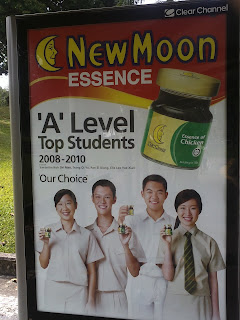
One of the differences between Singapore and the United States is the attitude towards education. In Singapore, being a good student is really the only acceptable goal in life, and this is measured in very exact ways (mostly by standardized tests). If you are successful, the rewards are substantial. Schools are covered in banners congratulating successful test-takers, and they are even used in advertisements (as shown above: there are at least two products with a similar ad campaign within walking distance of my apartment).
Later on, universities rank their graduates using a five-tiered system (instead of the three-tiered one in the US, I suppose because it allows for even more complex ranking). Your salary throughout your career is largely determined by this ranking, not only when starting, but permanently. And the government is largely controlled by these successful test-takers. (In fact, my husband's boss--a university professor--was previously appointed as a member of Parliament, presumably on the strength of his intellectual qualifications, since he knows nothing whatsoever about politics or government.) It is perhaps not surprising that Singapore has one of the world's best education systems.
The flip side of this intense focus on succeeding academically is that there is very little opportunity for creative self-expression or difference. A few months ago, I read a story about a medical student who had decided to drop out in order to pursue an interest in theater: the idea of choosing artistic endeavors over higher education was so bizarre to the average Singaporean that it made the national newspaper. And if a child has learning disabilities, or just isn't very good at school, then there is really no recourse for them. They are doomed to a life of poorly paid jobs and diminished opportunity. (Singapore actually doesn't even have public education for the disabled.)
No comments:
Post a Comment